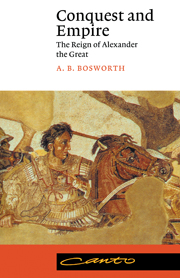2 - The gaining of empire (336–323 B.C.)
Published online by Cambridge University Press: 05 August 2012
Summary
The accession
The first few days of Alexander's reign must have been among the most critical of his career. Unfortunately no connected account survives of them. There are scraps of epitome and random flashbacks from later history, but most of the crucial details are irretrievably lost. There is infinite scope for speculation and imaginative reconstruction, but the sources themselves allow very little to be said. We must be prepared to admit our ignorance, however galling that may be.
At first there was turmoil. Alexander's friends gathered round him and occupied the palace, already armed for battle (Arr. 1.25.2). There was every reason to expect trouble, given the dynastic troubles of Philip's last year. The family and supporters of Attalus will certainly not have welcomed his accession, and there were other figures who might oppose him or form a focus for opposition. Amyntas (who had ephemerally succeeded his father Perdiccas in 359) and the sons of Aeropus from the princely house of Lyncestis are said to have commanded general attention (Plut. Mor. 327c). Only one of these groups is mentioned in the context of the assassination, the Lyncestian brothers. The sources strongly indicate that they were involved in the actual murder.3 That may be a post eventum fabrication to justify their subsequent execution, but there is no reason to believe so. The brothers may well have helped Pausanias plan the assassination.
- Type
- Chapter
- Information
- Conquest and EmpireThe Reign of Alexander the Great, pp. 25 - 173Publisher: Cambridge University PressPrint publication year: 1993



